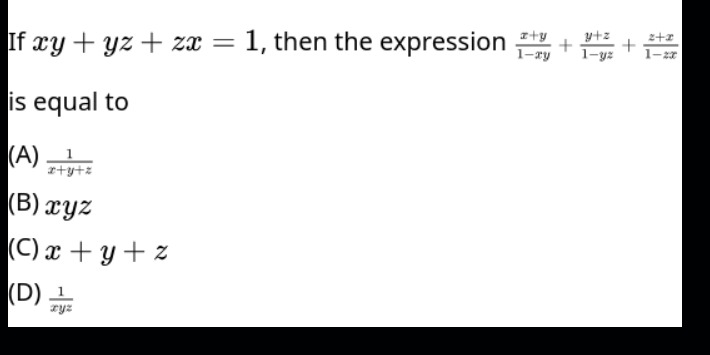Question
Question: If $xy + yz + zx = 1$, then the expression $\frac{x+y}{1-xy} + \frac{y+z}{1-yz} + \frac{z+x}{1-zx}$ ...
If xy+yz+zx=1, then the expression 1−xyx+y+1−yzy+z+1−zxz+x is equal to

x+y+z1
xyz
x+y+z
xyz1
xyz1
Solution
The problem asks us to simplify the expression 1−xyx+y+1−yzy+z+1−zxz+x given the condition xy+yz+zx=1.
Let's analyze each term of the expression using the given condition.
Step 1: Simplify the first term 1−xyx+y
From the given condition xy+yz+zx=1, we can rearrange it to find an expression for 1−xy: 1−xy=yz+zx
Factor out z from the right side: 1−xy=z(y+x)
Now substitute this into the first term: 1−xyx+y=z(x+y)x+y
Assuming x+y=0, we can cancel out (x+y) from the numerator and denominator: z(x+y)x+y=z1
Step 2: Simplify the second term 1−yzy+z
Similarly, from xy+yz+zx=1, we can find an expression for 1−yz: 1−yz=xy+zx
Factor out x from the right side: 1−yz=x(y+z)
Now substitute this into the second term: 1−yzy+z=x(y+z)y+z
Assuming y+z=0, we can cancel out (y+z) from the numerator and denominator: x(y+z)y+z=x1
Step 3: Simplify the third term 1−zxz+x
From xy+yz+zx=1, we can find an expression for 1−zx: 1−zx=xy+yz
Factor out y from the right side: 1−zx=y(x+z)
Now substitute this into the third term: 1−zxz+x=y(x+z)z+x
Assuming z+x=0, we can cancel out (z+x) from the numerator and denominator: y(x+z)z+x=y1
Step 4: Add the simplified terms
Now, substitute the simplified terms back into the original expression: 1−xyx+y+1−yzy+z+1−zxz+x=z1+x1+y1
To combine these fractions, find a common denominator, which is xyz: z1+x1+y1=xyzxy+xyzyz+xyzzx=xyzxy+yz+zx
Step 5: Use the given condition to find the final result
We are given that xy+yz+zx=1. Substitute this value into the expression: xyzxy+yz+zx=xyz1
Therefore, the final expression is xyz1.
